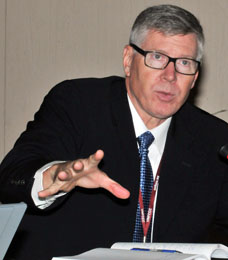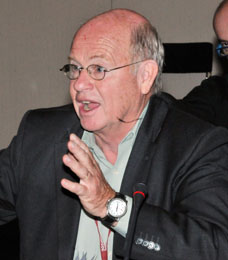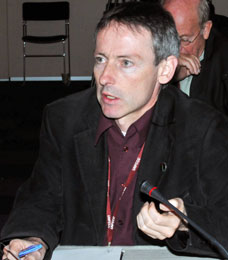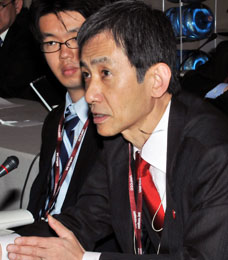|
|
 |
 |
 |
 |
 |
Enter your e-mail address
to get free e-mail reports |
|
|
|
|
 |
 |
 |
 |
 |
 |
 |
 |
Daily Reports
IISD Reporting Services (IISD RS) has produced daily reports of selected side events of this meeting. To download our reports please click below on the PDF icons that are next to the dates of your interest. |
|
 |
 |
 |
 |
|
 ENB on the Side - A Special Report on Selected Side Events at the Barcelona Climate Change Talks 2009 ENB on the Side - A Special Report on Selected Side Events at the Barcelona Climate Change Talks 2009
2-6 November 2009 | Barcelona, Spain
Events convened on Thursday, 5 November 2009 |
 |
 |
 |
 |
This event reviewed recent developments in mitigation technologies relating to renewable energy, geo-engineering, forestry, transportation and carbon dioxide capture and storage (CCS).
Steve Sawyer, Global Wind Energy Council (GWEC), discussed advances in renewable energy technologies, highlighting the dramatic increase in investment. He said wind, solar hot water and solar PV industries are expanding, while the biofuels sector has suffered some setbacks. He emphasized the importance of market mechanisms to incentivize investment, and smart and interconnected grids.
Andrew Watson, Royal Society, presented on the potential of geo-engineering, suggesting that carbon dioxide removal (CDR) is preferable because it addresses the root cause of climate change and is low risk as long as it does not interfere with natural ecosystems. However, he added that CDR takes a long time to work. He argued that another option, solar radiation management, could be useful in an emergency, but presents difficulties in terms of terminating such geo-engineering.
Francis Putz, University of Florida, said the carbon losses from forest degradation should not be ignored. He emphasized the role of sustainable forest management in reducing emissions but noted that emphasis on maximum sustained yields could put low carbon-density ecosystems in jeopardy. He said new technologies can create scenarios where additionality of REDD activities is clear and leakage is limited.
Lew Fulton, IEA, discussed the transportation sector, outlining IEA’s “BLUE Map scenarios,” which set out technology deployment alternatives to reduce emissions by 50 percent from current levels by 2050. He emphasized the importance of fuel efficiency gains, and outlined scenarios involving biofuels, electric vehicles and hydrogen. He noted growing concerns over biofuels, and work on second generation or advanced biofuels.
Brendan Beck, IEA, suggested that CCS could potentially deliver one-fifth of the needed emissions reduction by 2050. Arguing that the next ten years is critical, he said OECD countries should increase funding to US$3.5-4 billion each year from 2010-2020, with investment in non-OECD countries averaging US$1.5-2.5 billion annually. He highlighted the need for more demonstration projects, suitable legal/regulatory frameworks, and public engagement. On a question about leakage, he said there has been none reported to date.
|
|
 |
 |
 |
 |
|
 |
 |
 |
 |
This panel presented approaches to address the issue of lock-in of high-carbon energy production in developing countries, based on enhanced energy efficiency and market mechanisms.
Richard Baron, IEA, chaired the meeting and reviewed sectoral approaches that reduce emissions. He said expected emission reductions from CDM projects would come mostly from renewables, biomass, methane reduction, cement, biogas, and capture of industrial and fugitive gasses. However, he said little will come from LULUCF, and CDM would have only a one percent effect on projected emissions.
John Scowcroft, Eurelectric, discussed pathways to carbon-neutral electricity in Europe by 2050. He described a model in which: carbon-neutral electric power drives deep emissions cuts across the whole economy; power becomes the major transport fuel; all power generation options (including nuclear) are used; and there is a major push for energy efficiency.
André Aasrud, IEA, discussed sectoral credit mechanisms (SCM) as a means of reducing of governments’ monitoring burden. He described a market in which ex-ante issuance of allowances creates the possibility of devolving emission reduction programmes to individual business entities, thus engaging the private sector and relieving governments of otherwise costly domestic policies.
Participants discussed how carbon prices and SCM would operate together in the current investment environment, and future market scenarios.
|
|
 |
 |
 |
 |
 |
 |
 |
 |
 |
 |
 |
 |
| Participants during the discussion. |
|
 |
 |
 |
 |
 |
 |
 |
 |
This event examined options for action in moving ahead with mitigation in agriculture after Copenhagen.
Wendy Mann, FAO, introduced the consultation process on agricultural mitigation options for developing countries. She said this event would focus on an FAO paper on “Food Security and Agricultural Mitigation in Developing Countries: Options for Capturing Synergies,” whose authors were on the panel.
Leslie Lipper, FAO, spoke about synergies and trade-offs between food security and climate change that are addressed in the FAO paper. She said agriculture can be part of mitigation through cropland management, grazing land management, restoring cultivated organic soils, and restoring degraded lands.
Li Yue, Chinese Academy of Agricultural Sciences, addressed synergies between food security and mitigation/adaptation, using conservation tillage in China as a case study.
José Bulas Montoro, Mexico, addressed trade-offs between food security and agriculture/forestry. He called for a holistic vision of food security and mitigation involving consideration of the environment, water conservation and the social conditions of smallholders.
Elwyn Grainger-Jones, International Fund for Agricultural Development (IFAD), addressed financing and implementation of agriculture and climate change programmes. He noted that the carbon market will not cover all areas of mitigation and there is still a need for public finance in the short term.
Participants spoke about carbon storage crediting, the environmental costs of conservation tillage, biofuels and food security, and trade issues.
|
|
 |
 |
 |
 |
 |
 |
 |
 |
Angela Anderson, USCAN, highlighted the upcoming meetings between Presidents Obama and Hu Jintao, which are expected to include discussions on climate change.
Rob Bradley, World Resources Institute (WRI), commented on the US-China relationship, stating that no agreement would emerge without a clear understanding between them, and adding that the US Congress has a trust issue with China. He said any agreement would need MRV and symmetrical treatment of the US and China to sell the deal domestically in the US.
Julian Wong, Center for American Progress, said China has made significant steps forward on climate change for domestic reasons, including energy security, public health, the threats to water supply, economic opportunities in the clean energy sector and self-image. He identified three challenges: reconciling environmental and development objectives; population movement from rural to urban areas; and lack of attention to the energy-water nexus. He noted that all the components of MRV exist within the bureaucratic system in China and the new agreement with the IEA to improve collection of energy statistics.
Ailun Yang, Greenpeace China, said China has no choice but to tackle climate change due to its major impacts. She underscored that no country has yet succeeded in following a low-carbon development path and that if China does it will represent a revolution in the history of human development. She also noted that trade barriers send the wrong signal and that it is unfair of the US to ask for ambitious action and MRV from China without laying their own ambitious targets out on the table.
In the ensuing discussion, participants noted the dynamics of the US-China relationship, the possible outcomes of bilateral talks, and what each country brings to the table. Yang and Bradley suggested that China is not interested in a bilateral climate deal and that it prefers action within the UNFCCC context.
|
|
 |
 |
 |
 |
 |
 |
 |
 |
El panel compartió experiencias sobre actividades que están siendo llevadas a cabo en Latinoamérica en marco del proyecto “Política sobre el Clima 2012: Evaluación de las políticas de apoyo a la inversión y financiación a largo plazo para abordar el cambio climático después de 2012”.
Paz Valiente, España, dijo que su país apoya las actividades de financiamiento para iniciativas en la materia.
Emma Torres, del PNUD, destacó la colaboración entre el PNUD con el Banco Interamericano de Desarrollo (BID) y la Comisión Económica para América Latina y el Caribe (CEPAL).
Fernando Carrillo, del BID, propuso incluir los ministerios de finanzas en la discusión sobre cambio climático desarrollando políticas macroeconómicas, y fortaleciendo la política y capacidad institucional.
Carlos de Miguel, de CEPAL, informó sobre intensos dos años de estudio hechos en la región enfocandose en REDD, adaptación, análisis económico, y creación de capacidades. También expresó preocupaciones sobre el flujo de comercio en la región y medidas de frontera.
Los representantes de siete países de la región, hicieron presentaciones acerca de estudios, políticas, proyectos, y planes nacionales. Ecuador propuso un fondo para compensar la no extracción de petróleo en las áreas de bosques. Chile dijo que existe una ley que fomenta la energía renovable no convencional. México hizo énfasis en la creación de un nuevo mecanismo internacional dado que el MDL no es suficiente. Guatemala mencionó la nueva estrategia sobre cambio climático que incluye los impactos sociales y políticos, la estrategica social, y el trabajo de conciencia pública. Perú hizo referencia al trabajo de deforestación que se ha llevado a cabo con cooperación bilateral y multilateral. República Dominicana habló sobre el impacto económico de los desastres naturales. Costa Rica comentó sobre el sistema de pagos por servicios ambientales.
|
|
 |
 |
 |
 |
 |
 |
 |
 |
This event highlighted new work from various groups, including the UN Department of Economic and Social Affairs (UN DESA), World Bank and UN Development Programme (UNDP).
Alan AtKisson, UN DESA, introduced the World Economic and Social Survey (WESS) 2009. He explained that the WESS maps the pathway to a global renewable energy transition. He said UN DESA would also launch a “strategy briefing for decision makers” at Copenhagen and a longer technical report in early 2010. He said UN DESA wished to reframe climate change action as a positive-sum game that can achieve a “virtuous cycle” linking energy reform and development. He outlined elements of a “big push” for progress, including: integrating the climate and development agendas; committing to rapid development of renewable energy in the developing world; creating a large-scale investment fund; front-loading investments to bring costs down quickly; adopting a global feed-in tariff programme; strengthening national-level policies; and supplementing core global financing with tradable offsets, rather than relying primarily on the carbon market.
Ian Noble, World Bank, presented the “World Development Report 2010,” which focuses on development and climate change. He said the report argues that we should “act now, act together and act differently.” Noting that today’s actions determine tomorrow’s options, he said ambitious, precautionary policies do not imply significant additional costs. He suggested that high-income countries will need to take the lead and that all will have a role to play in radically-transforming energy systems.
Thomas Johansson, Lund University and GEA Executive Committee, highlighted major energy challenges, including how to achieve equity in energy services for the two billion people without electricity access, affordable energy services, secure supplies and climate change mitigation. He also highlighted the use of traditional fuels by two billion people, which he said has serious health, economic and emissions implications. Concluding that major energy system transformation is needed, he supported energy end-use efficiency, renewable energies and CCS.
Christophe Nuttall, UNDP, highlighted opportunities to support mitigation and adaptation progress at the sub-national and regional levels. He outlined UNDP’s support for partnerships between North and South to build and reinforce capacities at these levels.
Responding to a question about how to press the case for urgent action, Thomas Johansson said it was important to promote the economic rationale for action. Another participant said the conflict and security implications of inaction could be used to persuade those who do not take climate change seriously.
|
|
 |
 |
 |
 |

 |
 |
 |
 |
UN Framework Convention on Climate Change (UNFCCC) resources
 Official website Official website
 Daily programme Daily programme
 Side Events & Exhibits Side Events & Exhibits
 AWG-KP documents AWG-KP documents
 AWG-LCA documents AWG-LCA documents
 UNFCCC News UNFCCC News
UN resources
 Gateway to the UN System’s Work on Climate Change Gateway to the UN System’s Work on Climate Change
 Informal Thematic Debate of the UN General Assembly on Climate Change as a Global Challenge Informal Thematic Debate of the UN General Assembly on Climate Change as a Global Challenge
IISD RS resources
 IISD RS coverage of the Bangkok Climate Change Talks - 2009, 28 September - 9 October 2009, UN Conference Centre (UNCC), Bangkok, Thailand IISD RS coverage of the Bangkok Climate Change Talks - 2009, 28 September - 9 October 2009, UN Conference Centre (UNCC), Bangkok, Thailand
 IISD RS coverage of the Bonn Climate Change Talks - August 2009, 10-14 August 2009, Bonn, Germany IISD RS coverage of the Bonn Climate Change Talks - August 2009, 10-14 August 2009, Bonn, Germany
 IISD RS coverage of the Bonn Climate Change Talks - June 2009, 1-12 June 2009, Bonn, Germany IISD RS coverage of the Bonn Climate Change Talks - June 2009, 1-12 June 2009, Bonn, Germany
 IISD RS coverage of the UNFCCC Technical Workshop on Increasing Economic Resilience to Climate Change and Reducing Reliance on Vulnerable Economic Sectors through Economic Diversification, 28-30 April 2009, Cairo, Egypt IISD RS coverage of the UNFCCC Technical Workshop on Increasing Economic Resilience to Climate Change and Reducing Reliance on Vulnerable Economic Sectors through Economic Diversification, 28-30 April 2009, Cairo, Egypt
 IISD RS summary report of the Thirtieth Session of the Intergovernmental Panel
on Climate Change (IPCC), 21-23 April 2009, Antalya, Turkey (English: HTML - PDF) (Spanish: HTML - PDF) (Japanese: PDF) IISD RS summary report of the Thirtieth Session of the Intergovernmental Panel
on Climate Change (IPCC), 21-23 April 2009, Antalya, Turkey (English: HTML - PDF) (Spanish: HTML - PDF) (Japanese: PDF)
 IISD RS coverage of the Bonn Climate Change Talks - March/April 2009, 29 March - 8 April 2009, Bonn, Germany IISD RS coverage of the Bonn Climate Change Talks - March/April 2009, 29 March - 8 April 2009, Bonn, Germany
 IISD RS summary report of the UNFCCC Workshop on Integrating Practices, Tools and Systems for Climate Risk Assessment and Management and Disaster Risk Reduction Strategies into National Policies and Programmes, 10-12 March 2009, Havana, Cuba (HTML - PDF) IISD RS summary report of the UNFCCC Workshop on Integrating Practices, Tools and Systems for Climate Risk Assessment and Management and Disaster Risk Reduction Strategies into National Policies and Programmes, 10-12 March 2009, Havana, Cuba (HTML - PDF)
 IISD RS coverage of the UN Climate Change Conference - Poznań, 1-12 December 2008, Poznań, Poland IISD RS coverage of the UN Climate Change Conference - Poznań, 1-12 December 2008, Poznań, Poland
 IISD RS coverage of AWG-LCA 2, second part of the AWG-KP 5, and twenty-eighth sessions of the SBSTA and the SBI of the UNFCCC, 2-13 June 2008, Bonn, Germany IISD RS coverage of AWG-LCA 2, second part of the AWG-KP 5, and twenty-eighth sessions of the SBSTA and the SBI of the UNFCCC, 2-13 June 2008, Bonn, Germany
 IISD RS climate and atmosphere page IISD RS climate and atmosphere page
 Climate-L - A mailing list for news on climate change policy Climate-L - A mailing list for news on climate change policy
 Linkages Update - Bi-weekly international environment and sustainable development news Linkages Update - Bi-weekly international environment and sustainable development news
 MEA Bulletin - Newsletter on key MEAs and their secretariats MEA Bulletin - Newsletter on key MEAs and their secretariats
 Climate Change Policy & Practice - News and information on the actions of international organizations in responding to the problem of global climate change Climate Change Policy & Practice - News and information on the actions of international organizations in responding to the problem of global climate change
 African Regional Coverage African Regional Coverage |
|
 |
 |
 |
 |
|
|
 |
 |
 |
 |
 Please e-mail the Digital Editor should you have any questions regarding the content of this page Please e-mail the Digital Editor should you have any questions regarding the content of this page |
 |
 |
 |
 |
|
|
|